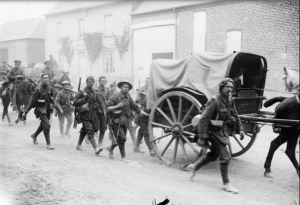
Our area lost one young man in this month - Private Raymond A Brereton, aged 21 of the 12th Northumberland Fusiliers (18186). He was born in Wilverston, the son of Joshua and Ruth who by 1901 were residing in Paddock Hill, Mobberley. He was one of 9 children. HIs father was a musical instrument repairer, dealer and piano tuner who had sadly died by 1911. His widow then ran the Plough and Flail Inn. Raymond was a grocer's assistant who joined Kitchener's New Army in 1914 and fought at Loos amongst other actions. He died of wounds on 26th June on the Somme 2 days after we began a week-long bombardment of well fortified and entrenched German positions and barbed wire on a 15 mile front. Raymond is interred at Mericourt L'Abbe Communal Cemetery Extension (6 kilometres south east of Albert) and is commemorated in St John's Lindow Church.
At the Chantilly Agreement of December 1915 Russia, France, Britain and Italy committed to simultaneous attacks on the Central Powers in the summer of 1916. Great battles and reversals led to one power rushing to defend their allies to prevent crushing defeats. The Germans continued to press forward at Verdun and the Italians were in dire straits at Asiago, so the Russians under General Alexei Brusilov stopped their long retreat and launched a coordinated attack on the Austro-Hungarians on 4th June in the western Ukraine and Poland. They gained 60 miles and 200,000 prisoners very quickly. The Germans therefore diverted divisions from Verdun to prevent annihilation and by September had stopped the rot - Brusilov being let down by the vacillating Russian Tsar (now Commander-in-Chief) and his favourite, the indolent General Alexei Evert. It was a most lethal offensive; Russia losing 500,000 and Austria-Hungary 1,325,000. Both giant empires now began to crumble.
The British continued to build up their forces for the "big push". Everyone knew what was coming, including the Germans. The increasingly criticised Field Marshal Kitchener drowned this month en route to Russia on HMS Hampshire, sunk by a mine just off Orkney. Many of his New Army, the proud battalions of the "Pals" regiments he had raised in 1914 were to suffer terribly on 1st July 1916.
Photo: Preparations on the Somme 28th June.
Jon Armstrong and Alan Cooper
Wilmslow Historical Society









